So. Much. Fun. There are a whole lot of adjectives I could use to describe my introduction to a Louisiana Crawfish Boil, but WOW sums it up nicely.
I’m laying out all the steps here so you can set up and cook a Louisiana seafood boil with shrimp or crawfish. Spoiler alert – doing a Louisiana-style seafood boil on the stove is much simpler than you might think. (I’ll be sharing directions specifically for a shrimp boil at home next week!)
Heads up – this is going to be a long one. If you are just here for the instructions, hit that handy “jump to recipe” button at the top of the post.
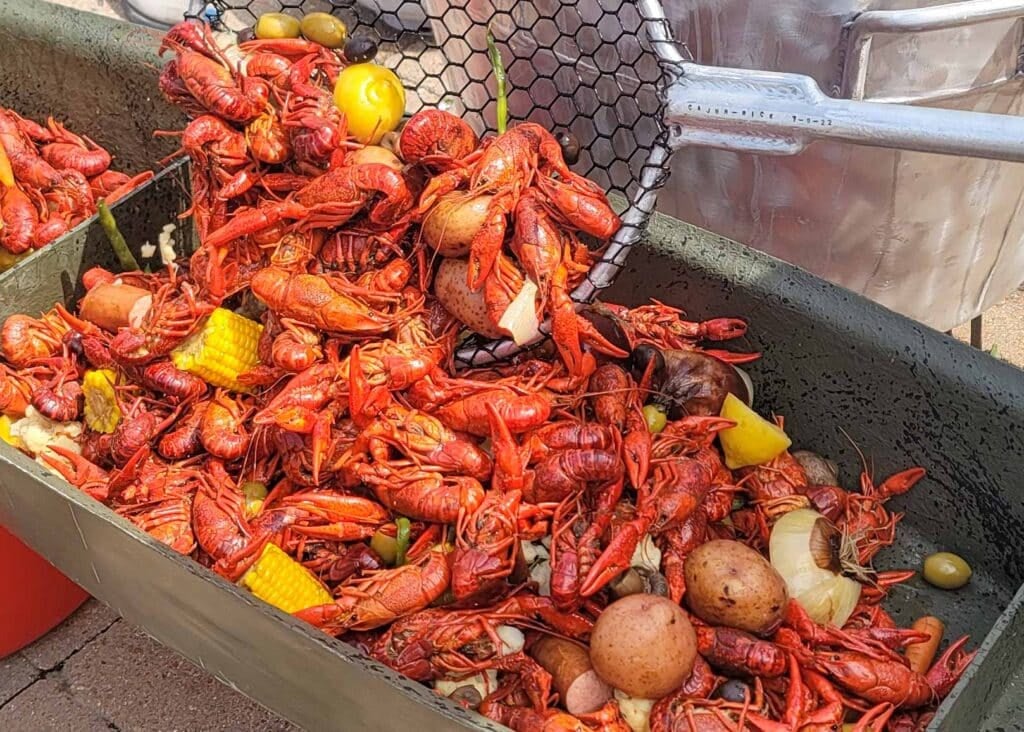
Crawfish Boil
While in Louisiana for Sean’s family reunion, our cousin Rick volunteered to do a Louisiana-style crawfish boil for us. And oh, there really aren’t words for how excited I was to experience this for the first time.
As far as eating crawfish goes, if you aren’t familiar with them already, they taste like a cross between their crustacean cousins lobster and shrimp. What’s not to love about that?
I was thrilled we were able to be there from start to finish and learn from the master. And yeah, Rick is a legit master of the seafood boil. Don’t miss the custom skimmer, the crawfish on his belt and his hat, and the very cool stirring paddle in some of the photos for evidence of his passion for it all.
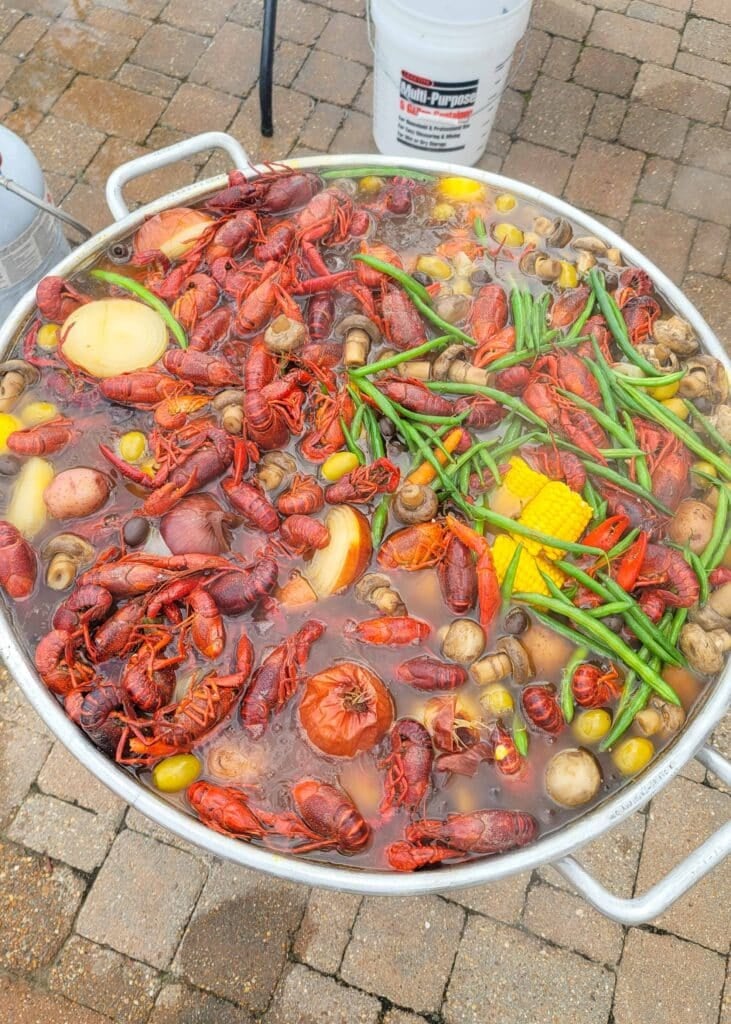
Crawfish boils are a social event in Louisiana – and wherever else you might be lucky enough to enjoy one. This isn’t just a meal shared with friends or family. It’s an experience. (Have I stated that clearly enough?)
Ha, and here’s a pro tip for you: Don’t wear white, friends. That’s a rookie move and your Tide stick will be put to good use after the boil. Just ask me how I know this.
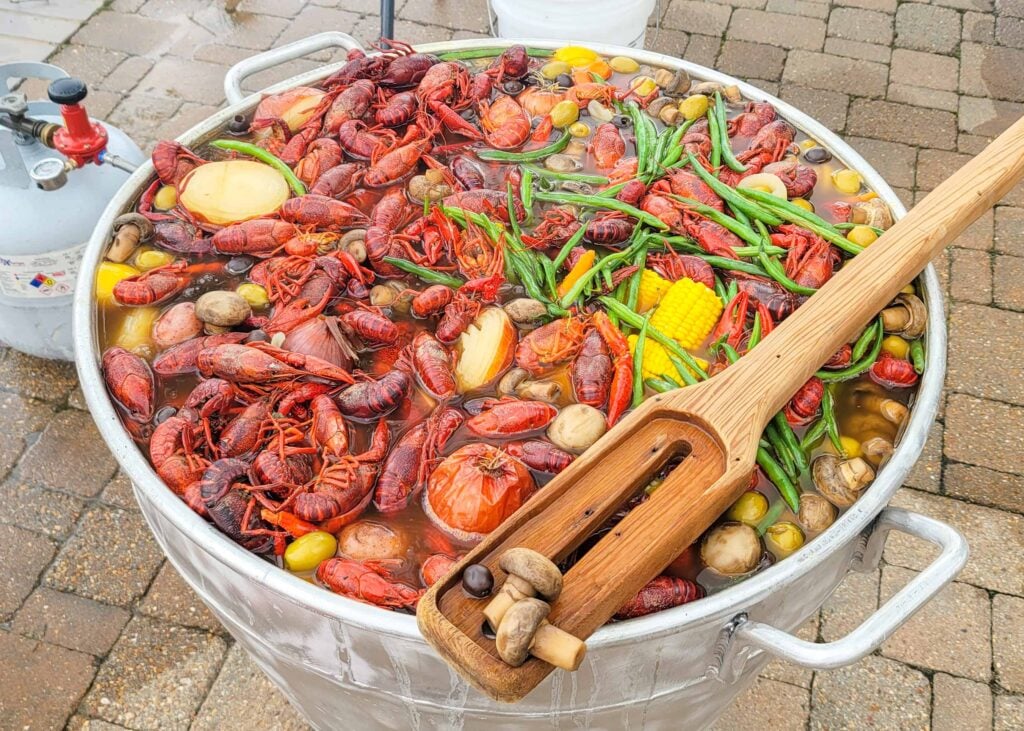
Crayfish vs Crawfish
First things first, is it a crawfish? a crayfish? a crawdad? Yes to them all. The name you are most likely to use simply depends on where you live or where you grew up.
Louisianans call them crawfish, whereas people in northern states are more likely to say crayfish. In the southwest, where I grew up, we called them crawdads.
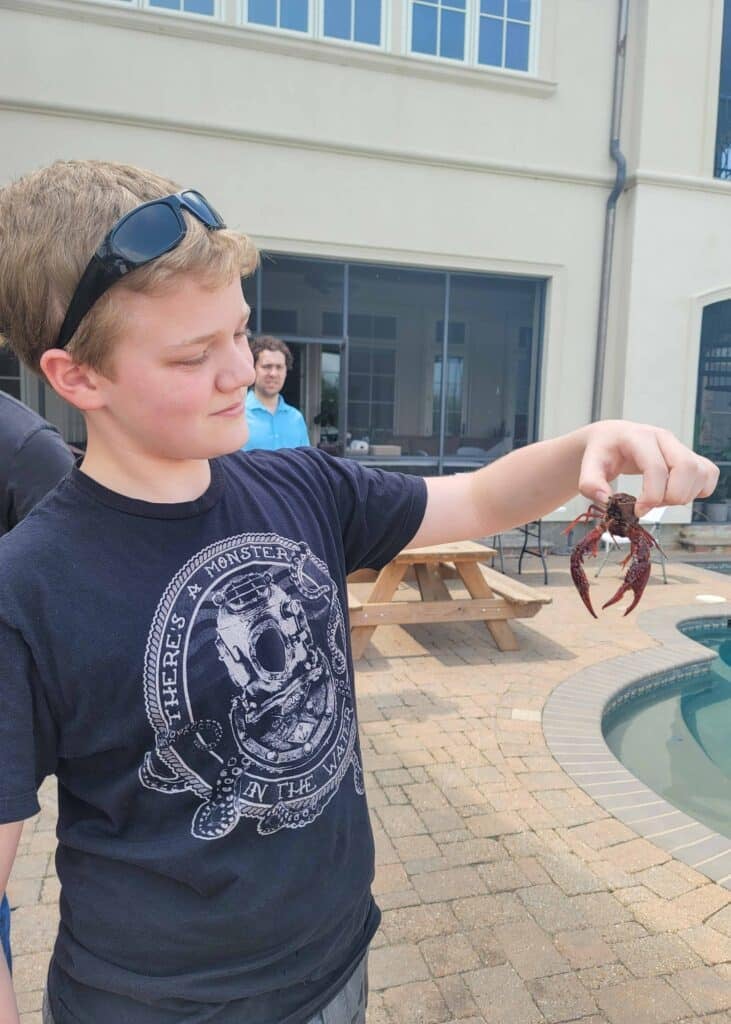
My Uncle Clarence would catch as many crawdads from the edge of the lake as he could on our annual family camping trips and then bring them back to camp. He’d boil them in a little saucepan on our camp stove and we’d dip those minuscule bits of meat from the tails in melted butter.
Definitely more of a fun memory than a meal, but nonetheless, I suppose that was technically my first crawdad boil. I sent him photos of our boil in Louisiana and it was fun to share the memory with him again.
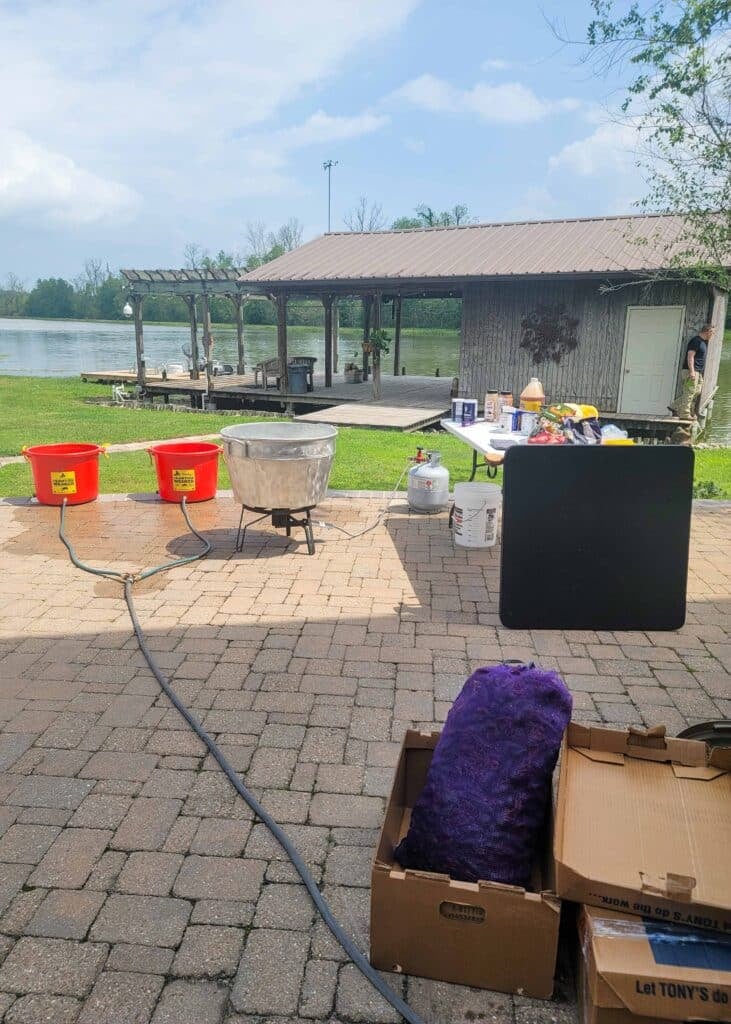
Crawfish Boil Equipment
For a full outdoor crawfish boil, you’ll need the following equipment:
If you’re just getting started, there’s no need to go crazy with a massive crawfish pot, but don’t let me stop you if that sounds like fun. A simple 60-quart stockpot is all you need for small to medium-sized boils. (This pot comes with a handy strainer basket.)
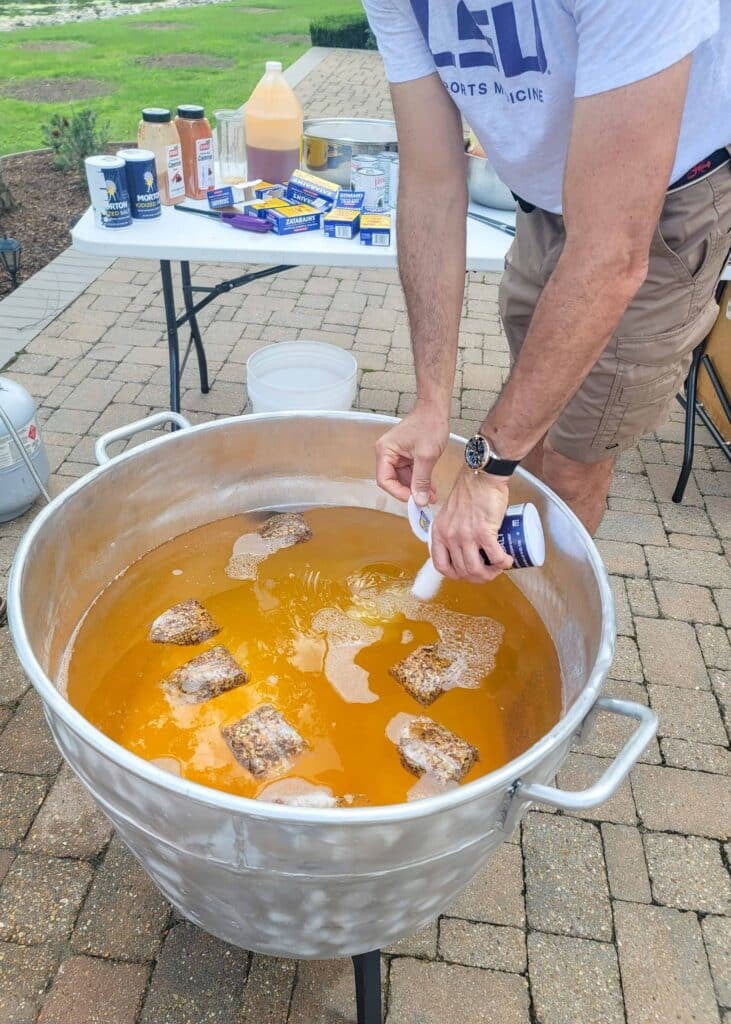
Stovetop Boil Equipment
If you only need to feed 2-4 people, or if you don’t care about all the extra ingredients, you can reduce the recipe amounts below. That said, I think you should add them all, as the extras add so much awesomeness to a seafood boil!
Most of the necessary boil equipment for a smaller-scale boil is likely already in your kitchen and you’ll only need an 8, 10, or 12-quart pot. (That 12-quart pot is a screaming deal, btw.)
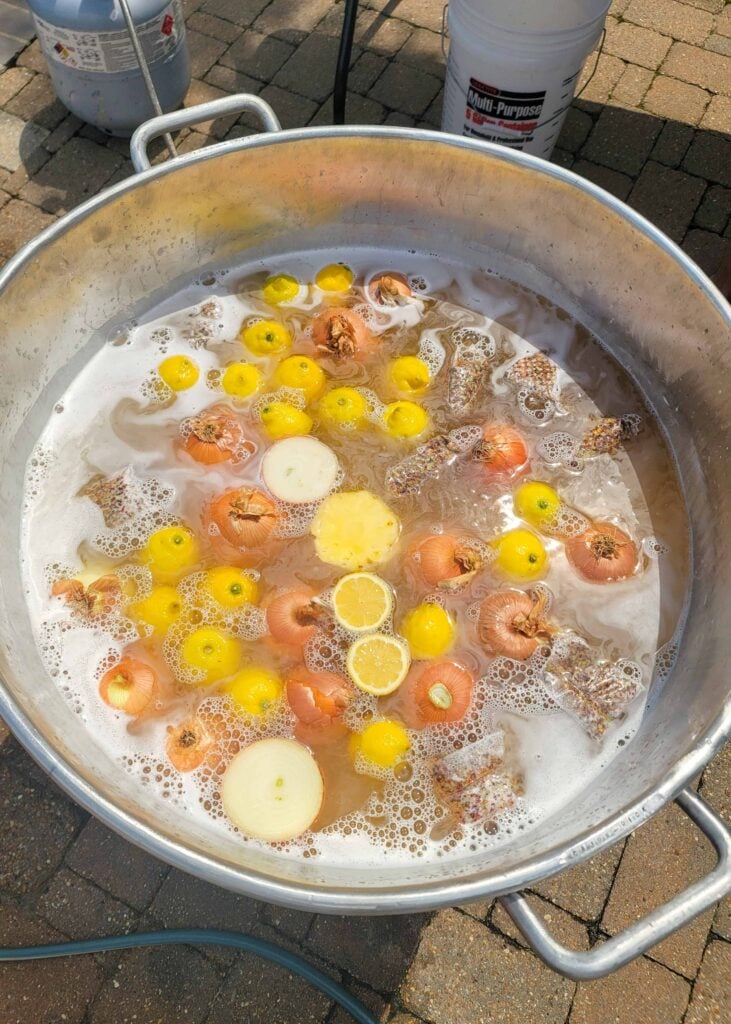
Crawfish Boil Ingredients
The ingredients listed in the recipe card will provide enough food for 6-8 people, likely when doing a smaller crawfish boil on the stove.
You can adjust the amounts below by sliding the serving size up or down according to your needs.
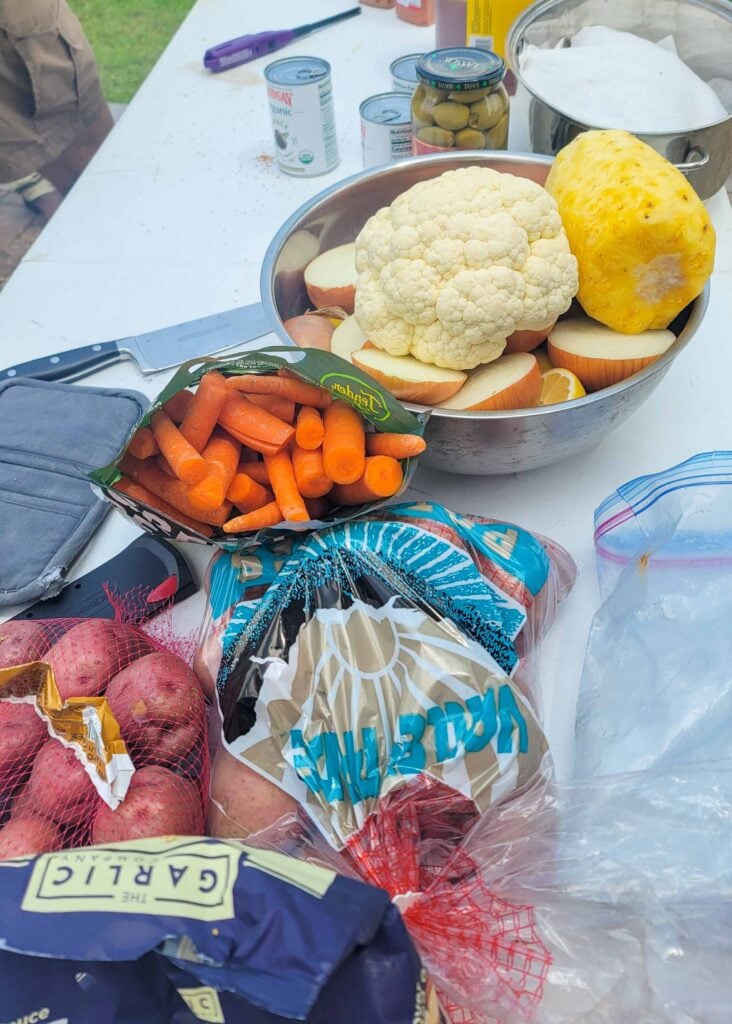
You’ll need the following ingredients for a Louisiana-style crawfish or shrimp boil:
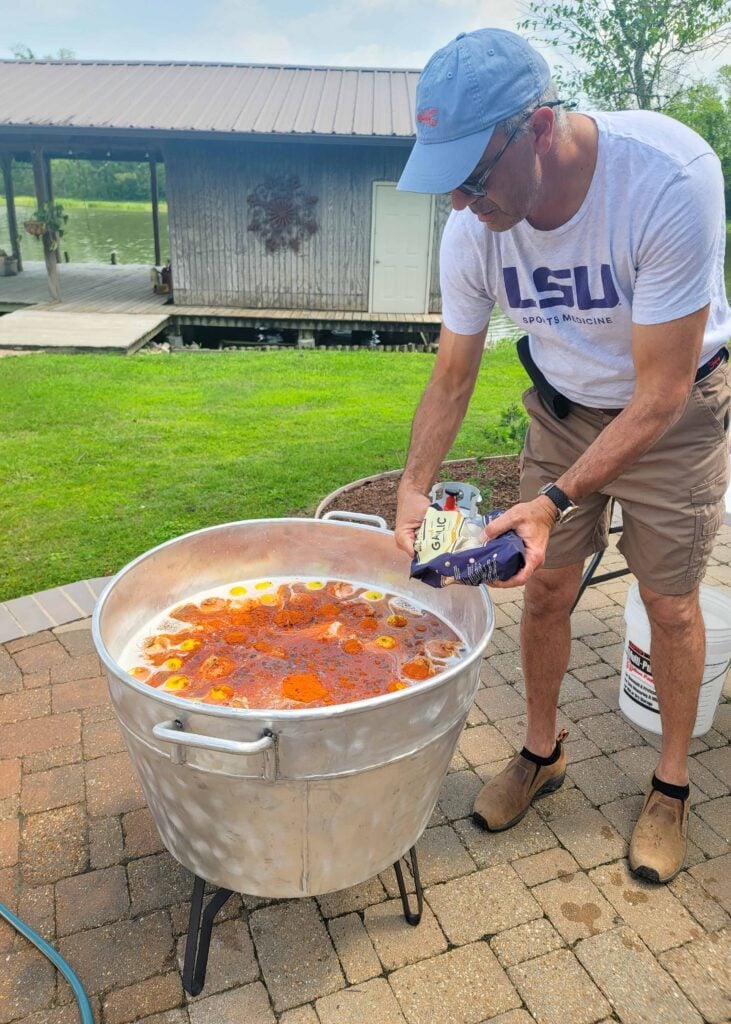
Cajun Crawfish Boil
Depending on where you live, you may be able to find the seasonings both locally and/or in smaller quantities. Don’t be afraid of the cayenne pepper here, friends. I linked the large container above, because I watched Rick at least a cup of it into the pot of water. The result was a bit of heat, but honestly not all that much.
If you aren’t a fan of sausage, that can be skipped as well. Keep in mind though, the sausage offers an appreciated alternative for any guests who may not be fans of seafood, yet want to enjoy the boil with you.
Sausage also offers an additional more frugal meat option, if you have a large family, a crew of meat lovers, or teenage boys who will enjoy having more meat variety included.
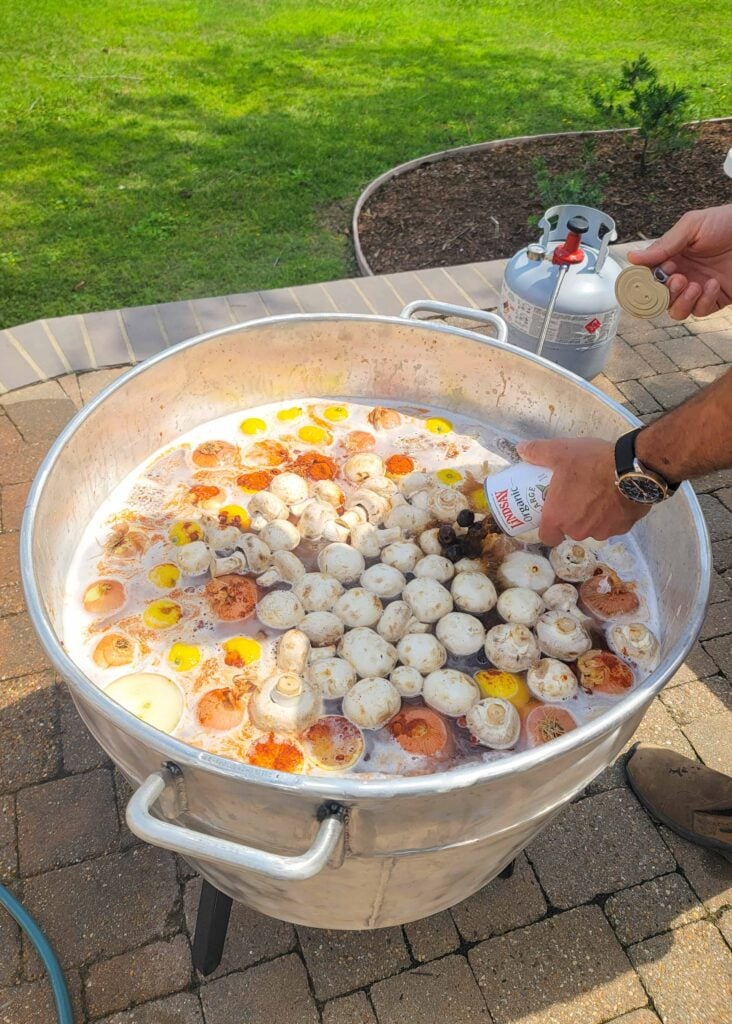
The vegetables in the boil are all optional, so feel free to adjust them as you like. That said, I highly recommend trying a boil with all of them.
The variety here makes a big difference in the final result. Doing a seafood boil with so many different ingredients delivers awesome results!
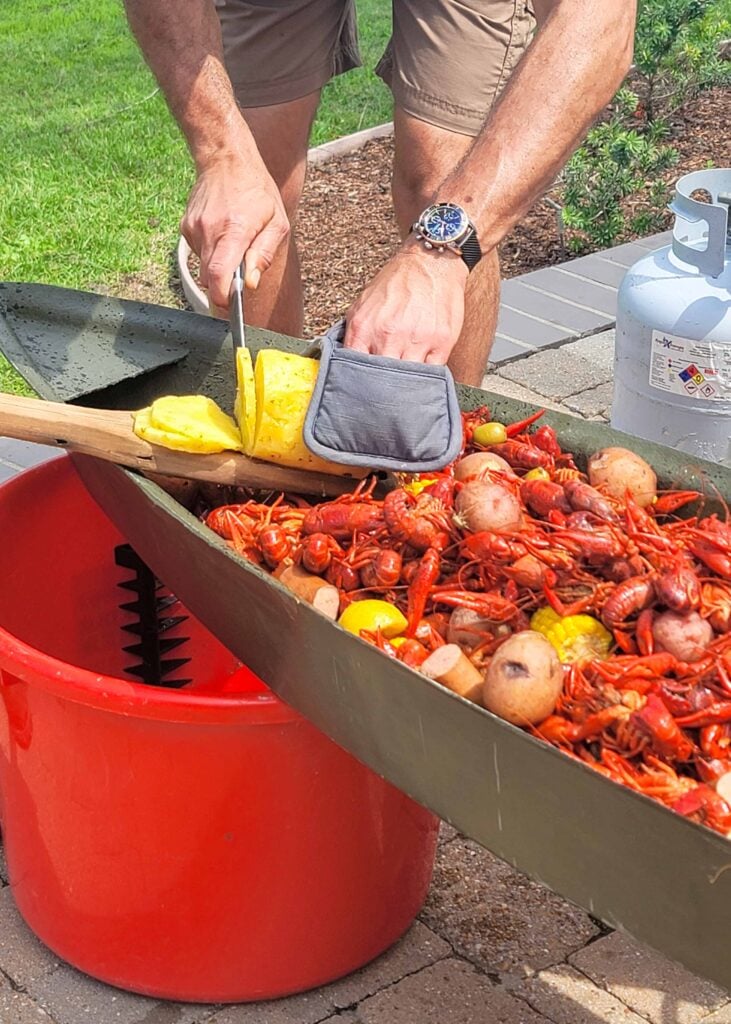
While pineapple isn’t always used in a boil, I am so glad that it was there. The pineapple soaks whole in the boiling seasoning and spices.
The result is sweet and spicy, perfectly softened with a firm bite remaining. There wasn’t a scrap of the sliced pineapple left at the end of the day.
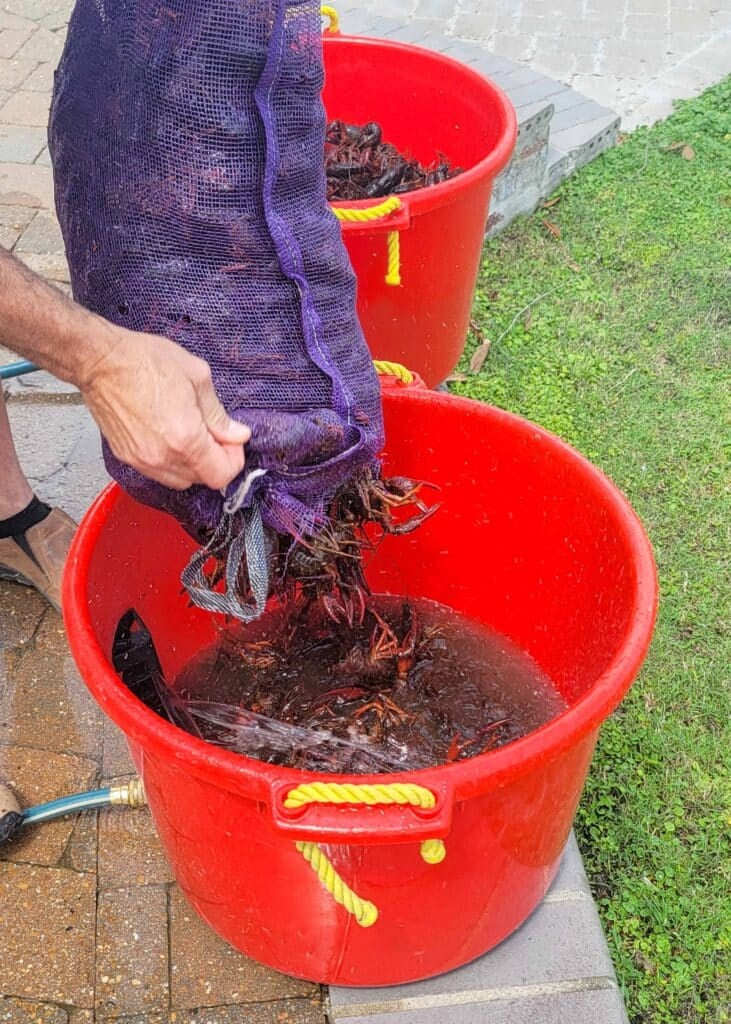
Washing Crawfish
Rinse the crawfish well before cooking. You can use a handy crawfish washer like this one, if you’re diving into the whole full-blown crawfish boil experience, but you can also simply wash a smaller amount in a clean sink. Remove any dead crawfish before cooking.
While some people choose to salt the water in an attempt to purge the crawfish, it’s not always recommended or proven useful. So, rinse them well, but save the salt. If you choose to salt/purge them, that’s fine too.
If you’ve purchased crawfish in a mesh sack, you can submerge it in fresh water multiple times until the used water is clear.
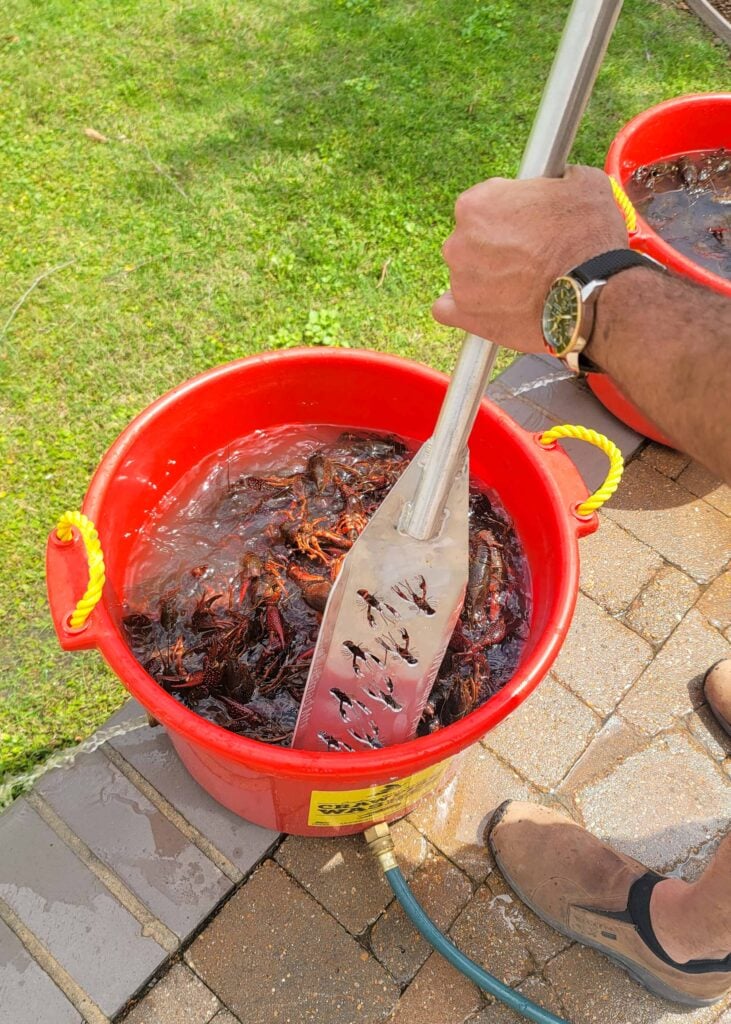
How to Do a Crawfish Boil
The fun begins with a giant pot of water. Add the seasoning packets, liquid boil, salt, and a whole lot of cayenne pepper.
Add the onions, lemons, potatoes, and fresh pineapple, and bring to a boil. When the pot is boiling, add the garlic, mushrooms, carrots, and olives. Return to a full boil.
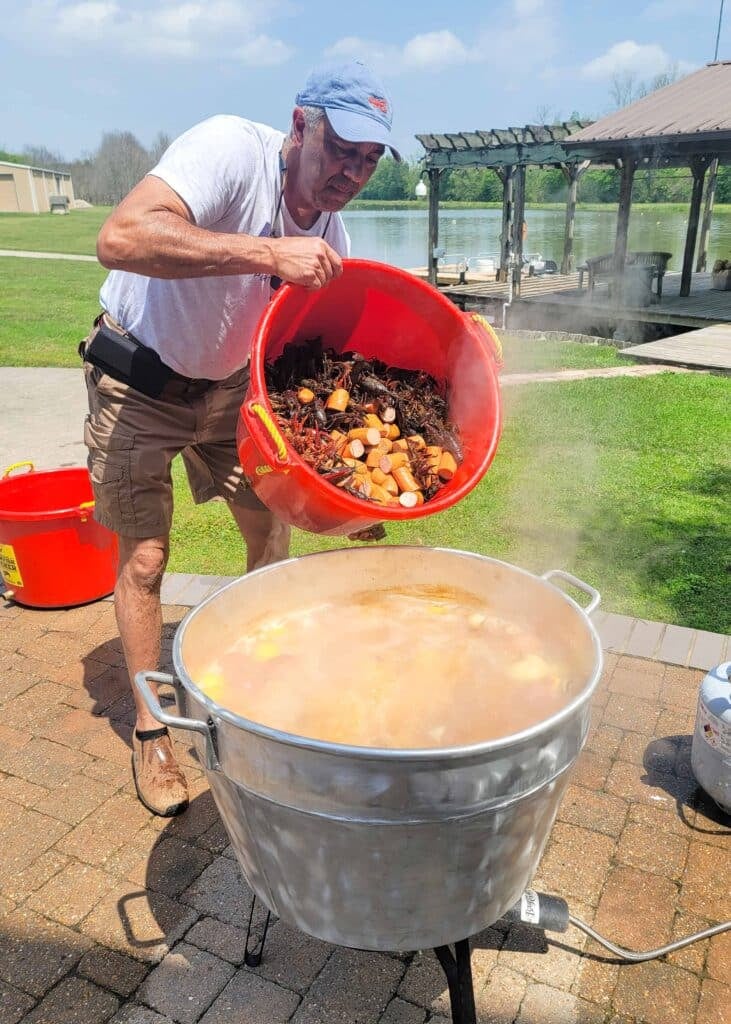
Add the sausage and the crawfish (or shrimp). Add more cayenne, if you want it spicy.
Bring the pot back to a full boil for just a few minutes (about 3 minutes for crawfish and 1-2 minutes for shrimp) and then turn off the heat.
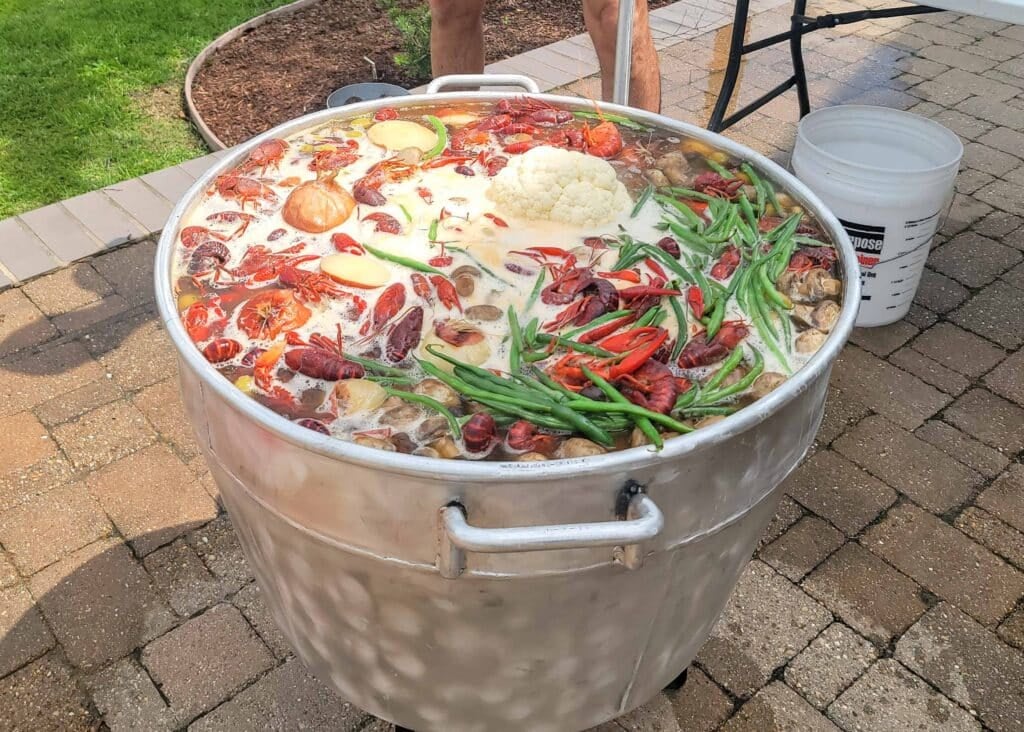
Add the corn, cauliflower, and green beans, and let everything rest for about 15 minutes.
Test the crawfish or shrimp to see if they’ve absorbed the flavors and try not to burn your mouth on the irresistible hot vegetables and olives.
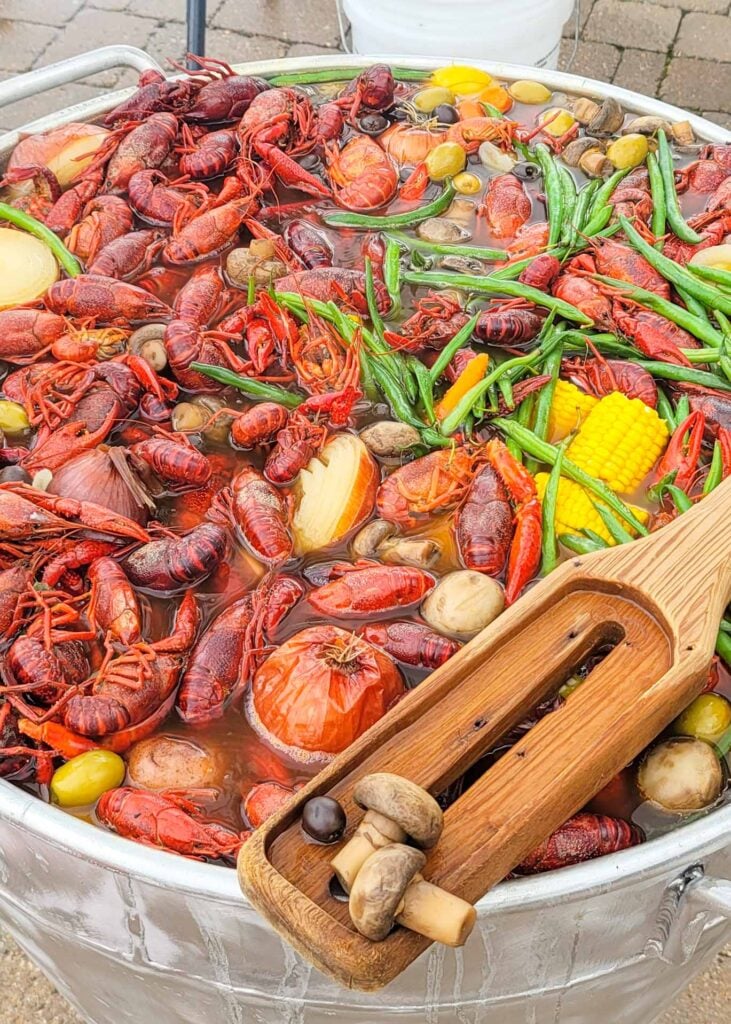
Use a strainer to pull the food from the pot and transfer it to a large tray or bowl. Pull the pineapple and use a sharp knife to slice it thinly.
Serve with Cajun dipping sauce and enjoy!
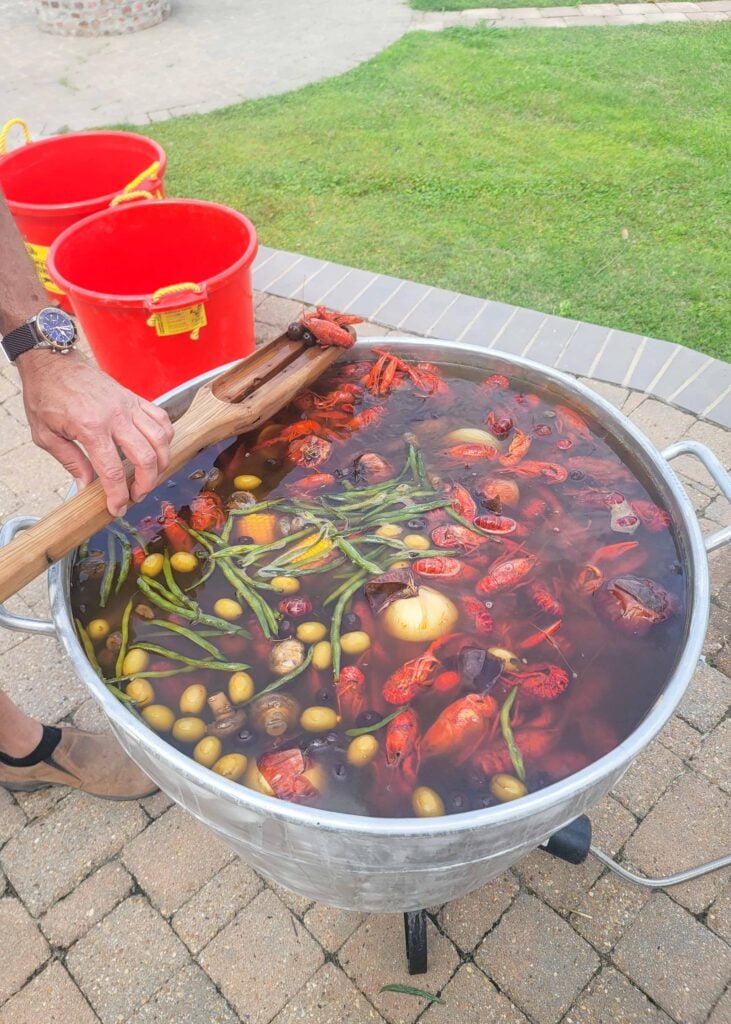
How Long to Boil Crawfish
Return the pot to a boil after adding the crawfish and boil for about 3-5 minutes. The crawfish will turn a bright red and float to the top of the pot.
Turn the heat off and allow the crawfish to soak for an additional 15 minutes or so. They will start sinking as they absorb the flavoring from the pot.
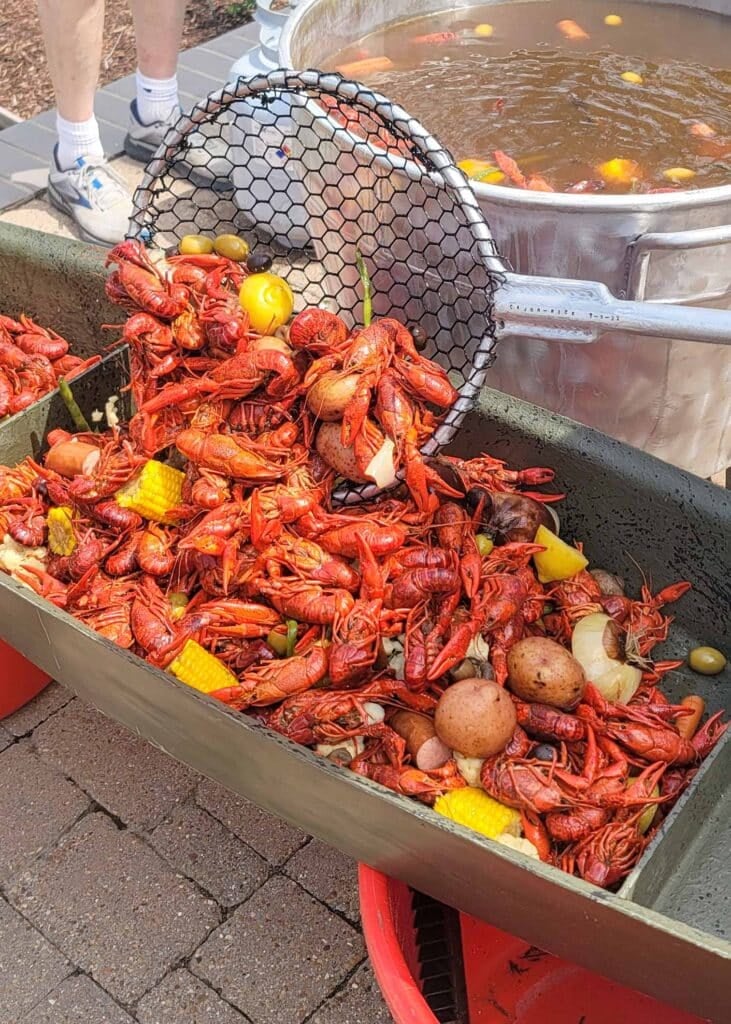
Pull a crawfish from the pot and break off the tail, tip the body upside down, and see if liquid drips out. When this happens, the crawfish is ready to eat.
Drain or strain the ingredients from the pot and serve immediately.
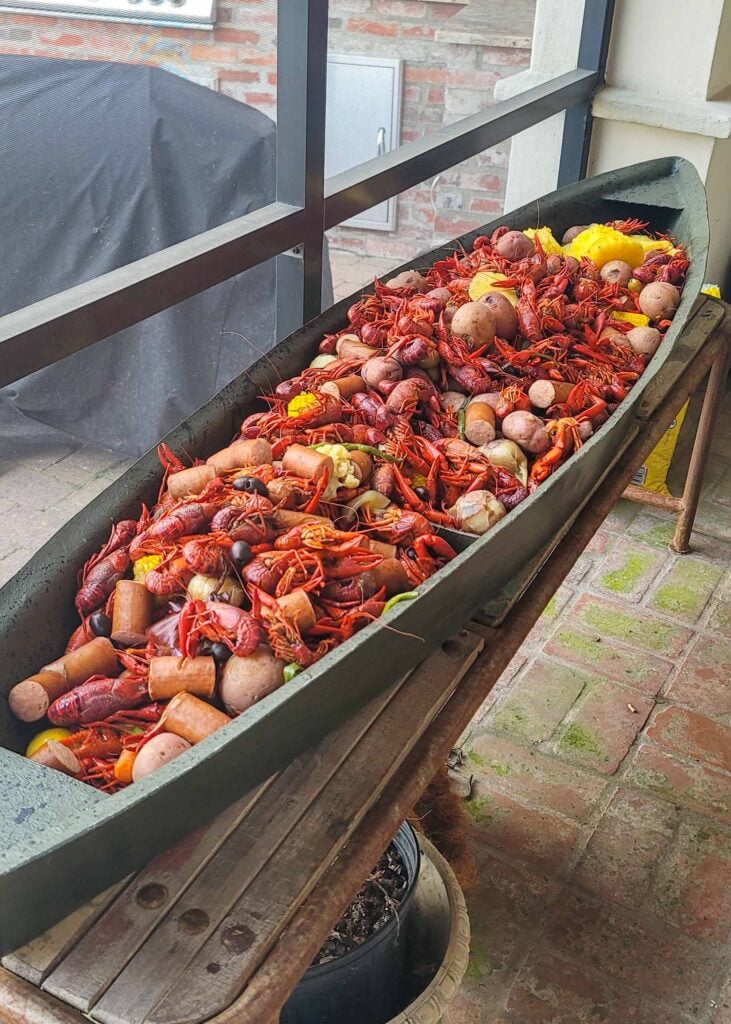
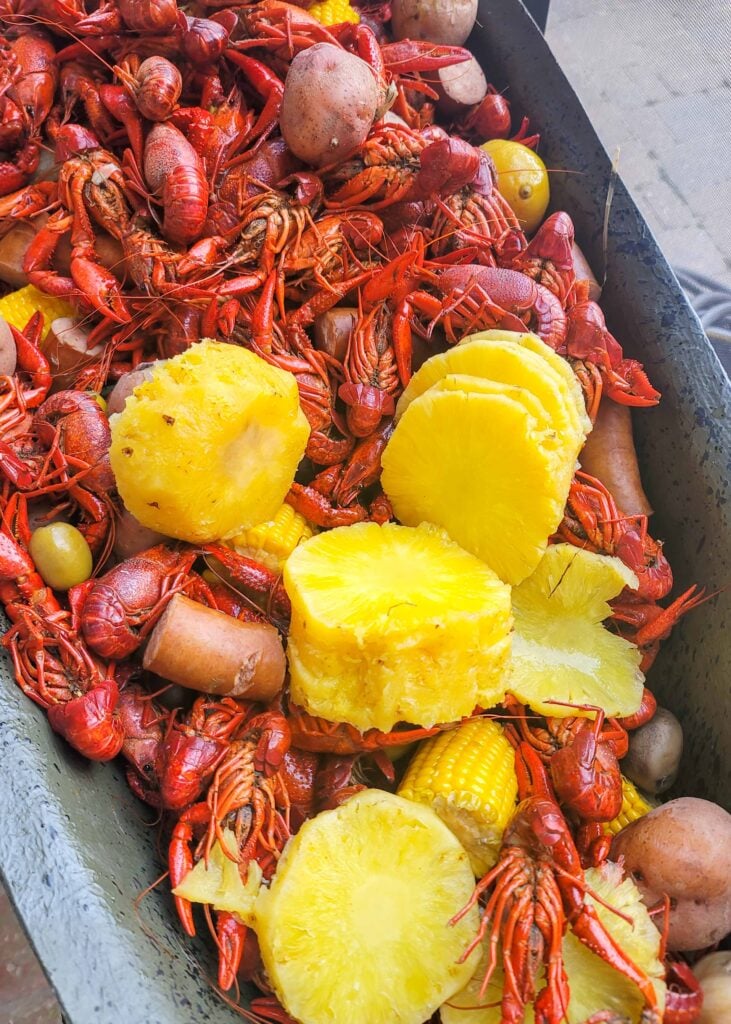
Servings: 6
Prevent your screen from going dark
-
Rinse the crawfish well before cooking. You can use a handy crawfish washer like this one, if you’re diving into the whole full-blown crawfish boil experience, but you can also simply wash a smaller amount in a clean sink. Remove any dead crawfish before cooking.
-
Fill your giant pot about half full of water and bring it to a boil. Add the seasoning packets, liquid boil, salt, and a whole lot of cayenne pepper.
-
Add the onions, lemons, potatoes, and fresh pineapple, and return it to a boil. When the pot is boiling, add the garlic, mushrooms, carrots, and olives. Return to a full boil.
-
Add the sausage and the crawfish. Add more cayenne, if you want it spicy. Return the pot to a boil after adding the crawfish and boil for about 3-5 minutes. The crawfish will turn a bright red and float to the top of the pot.
-
Turn the heat off and add the corn, cauliflower, and green beans. Allow the crawfish to soak for an additional 15 minutes or so. They will start sinking as they absorb the flavoring from the pot.
-
Pull a crawfish from the pot and break off the tail, tip the body upside down, and see if liquid drips out. When this happens, the crawfish is ready to eat.
-
Use a strainer to pull the food from the pot and transfer it to a large tray or bowl. Pull the pineapple and use a sharp knife to slice it thinly. Serve with Cajun dipping sauce.
Calories: 707kcal · Carbohydrates: 66g · Protein: 51g · Fat: 30g · Saturated Fat: 9g · Polyunsaturated Fat: 4g · Monounsaturated Fat: 13g · Cholesterol: 302mg · Sodium: 1379mg · Potassium: 2413mg · Fiber: 15g · Sugar: 21g · Vitamin A: 17519IU · Vitamin C: 139mg · Calcium: 254mg · Iron: 7mg
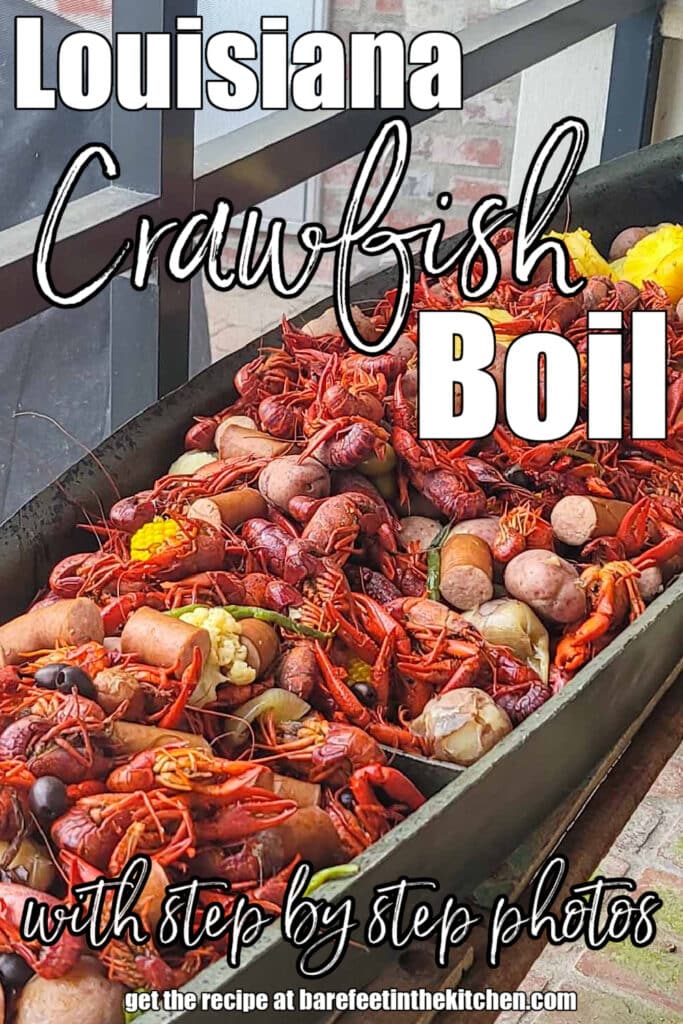
Trending Products

GE Electronic Window Air Conditioner 6000 BTU, Efficient Cooling for Smaller Areas Like Bedrooms and Guest Rooms, 6K BTU Window AC Unit with Easy Install Kit, White

Alen BreatheSmart Classic H13 HEPA Air Purifier, Air Purifiers For Home Large Room w/ 1100 SqFt Coverage, Medical-Grade Air Cleaner for Pet Dander & Odor, up to 12 Mos. Filter Life, Espresso
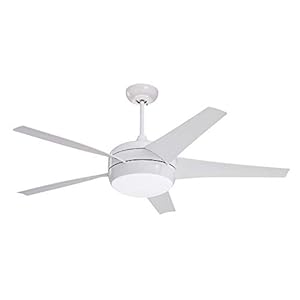
Luminance Midway Eco LED Ceiling Fan with Light and Remote | Dimmable 54 Inch Fixture with DC Motor | Contemporary 5 Blade Design with Downrod Mount for Hanging, Appliance White
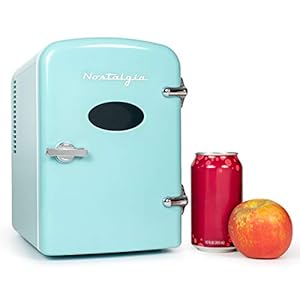
Nostalgia RF6RRAQ Retro 6-Can Personal Cooling and Heating Mini Refrigerator with Carry Handle for Home Office, Car, Boat or Dorm Room-Includes AC/DC Power Cords,,1 cubic feet, Aqua










